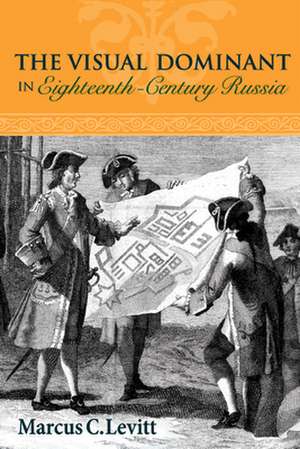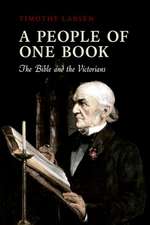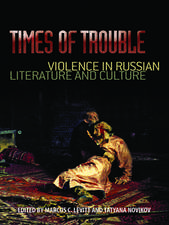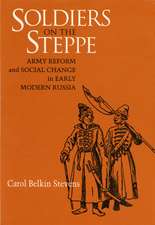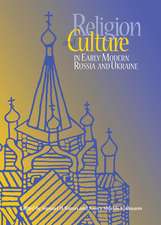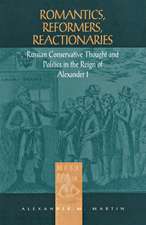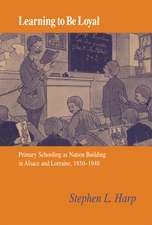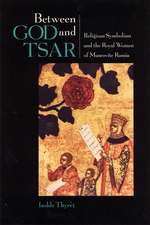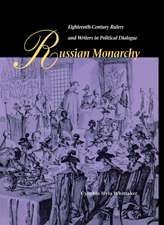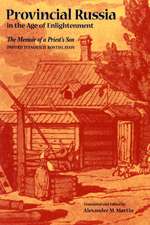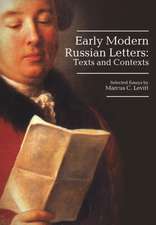The Visual Dominant in Eighteenth-Century Russia: NIU Series in Slavic, East European, and Eurasian Studies
Autor Marcus C. Levitten Limba Engleză Hardback – 12 ian 2012
The Enlightenment privileged vision as the principle means of understanding
the world, but the eighteenth-century Russian preoccupation
with sight was not merely a Western import. In his masterful study,
Levitt shows the visual to have had deep indigenous roots in Russian
Orthodox culture and theology, arguing that the visual played a crucial
role in the formation of early modern Russian culture and identity.
Levitt traces the early modern Russian quest for visibility from jubilant
self-discovery, to serious reflexivity, to anxiety and crisis. The book
examines verbal constructs of sight—in poetry, drama, philosophy,
theology, essay, memoir—that provide evidence for understanding the
special character of vision of the epoch. Levitt’s groundbreaking work
represents both a new reading of various central and lesser known texts
and a broader revisualization of Russian eighteenth-century culture.
Works that have considered the intersections of Russian literature and
the visual in recent years have dealt almost exclusively with the modern
period or with icons. The Visual Dominant in Eighteenth-Century Russia
is an important addition to the scholarship and will be of major interest
to scholars and students of Russian literature, culture, and religion, and
specialists on the Enlightenment.
the world, but the eighteenth-century Russian preoccupation
with sight was not merely a Western import. In his masterful study,
Levitt shows the visual to have had deep indigenous roots in Russian
Orthodox culture and theology, arguing that the visual played a crucial
role in the formation of early modern Russian culture and identity.
Levitt traces the early modern Russian quest for visibility from jubilant
self-discovery, to serious reflexivity, to anxiety and crisis. The book
examines verbal constructs of sight—in poetry, drama, philosophy,
theology, essay, memoir—that provide evidence for understanding the
special character of vision of the epoch. Levitt’s groundbreaking work
represents both a new reading of various central and lesser known texts
and a broader revisualization of Russian eighteenth-century culture.
Works that have considered the intersections of Russian literature and
the visual in recent years have dealt almost exclusively with the modern
period or with icons. The Visual Dominant in Eighteenth-Century Russia
is an important addition to the scholarship and will be of major interest
to scholars and students of Russian literature, culture, and religion, and
specialists on the Enlightenment.
Din seria NIU Series in Slavic, East European, and Eurasian Studies
-
 Preț: 138.18 lei
Preț: 138.18 lei -
 Preț: 89.68 lei
Preț: 89.68 lei -
 Preț: 197.11 lei
Preț: 197.11 lei -
 Preț: 185.88 lei
Preț: 185.88 lei -
 Preț: 239.52 lei
Preț: 239.52 lei -
 Preț: 169.95 lei
Preț: 169.95 lei -
 Preț: 131.39 lei
Preț: 131.39 lei -
 Preț: 130.71 lei
Preț: 130.71 lei -
 Preț: 216.21 lei
Preț: 216.21 lei -
 Preț: 219.33 lei
Preț: 219.33 lei -
 Preț: 114.05 lei
Preț: 114.05 lei -
 Preț: 238.40 lei
Preț: 238.40 lei -
 Preț: 255.55 lei
Preț: 255.55 lei -
 Preț: 179.03 lei
Preț: 179.03 lei -
 Preț: 205.71 lei
Preț: 205.71 lei -
 Preț: 190.06 lei
Preț: 190.06 lei -
 Preț: 153.39 lei
Preț: 153.39 lei -
 Preț: 255.62 lei
Preț: 255.62 lei -
 Preț: 127.66 lei
Preț: 127.66 lei -
 Preț: 200.18 lei
Preț: 200.18 lei -
 Preț: 131.46 lei
Preț: 131.46 lei -
 Preț: 285.23 lei
Preț: 285.23 lei -
 Preț: 191.59 lei
Preț: 191.59 lei -
 Preț: 175.99 lei
Preț: 175.99 lei -
 Preț: 215.93 lei
Preț: 215.93 lei -
 Preț: 177.43 lei
Preț: 177.43 lei -
 Preț: 150.97 lei
Preț: 150.97 lei -
 Preț: 283.86 lei
Preț: 283.86 lei -
 Preț: 185.25 lei
Preț: 185.25 lei -
 Preț: 216.00 lei
Preț: 216.00 lei -
 Preț: 214.64 lei
Preț: 214.64 lei -
 Preț: 178.19 lei
Preț: 178.19 lei -
 Preț: 136.13 lei
Preț: 136.13 lei -
 Preț: 201.03 lei
Preț: 201.03 lei -
 Preț: 351.49 lei
Preț: 351.49 lei -
 Preț: 185.82 lei
Preț: 185.82 lei -
 Preț: 108.71 lei
Preț: 108.71 lei -
 Preț: 191.37 lei
Preț: 191.37 lei -
 Preț: 136.13 lei
Preț: 136.13 lei -
 Preț: 118.20 lei
Preț: 118.20 lei -
 Preț: 261.47 lei
Preț: 261.47 lei -
 Preț: 202.52 lei
Preț: 202.52 lei -
 Preț: 162.54 lei
Preț: 162.54 lei -
 Preț: 223.69 lei
Preț: 223.69 lei -
 Preț: 270.18 lei
Preț: 270.18 lei -
 Preț: 158.38 lei
Preț: 158.38 lei
Preț: 423.11 lei
Nou
Puncte Express: 635
Preț estimativ în valută:
80.97€ • 83.54$ • 68.53£
80.97€ • 83.54$ • 68.53£
Carte tipărită la comandă
Livrare economică 04-18 martie
Preluare comenzi: 021 569.72.76
Specificații
ISBN-13: 9780875804422
ISBN-10: 087580442X
Pagini: 374
Dimensiuni: 152 x 229 x 33 mm
Greutate: 0.64 kg
Ediția:1
Editura: Northern Illinois University Press
Colecția Northern Illinois University Press
Seria NIU Series in Slavic, East European, and Eurasian Studies
ISBN-10: 087580442X
Pagini: 374
Dimensiuni: 152 x 229 x 33 mm
Greutate: 0.64 kg
Ediția:1
Editura: Northern Illinois University Press
Colecția Northern Illinois University Press
Seria NIU Series in Slavic, East European, and Eurasian Studies
Recenzii
"[A] groundbreaking new book."
—Slavonic and East European Review
“Levitt puts forth a fascinating and highly original thesis concerning the centrality of visual motifs in Russia’s Enlightenment culture. I found the discussion of Orthodox theology and the ways it echoed in eighteenth-century literature to be innovative, intellectually stimulating, and persuasive.”
—Elise Kimerling Wirtschafter, California State Polytechnic University Pomona
—Slavonic and East European Review
“Levitt puts forth a fascinating and highly original thesis concerning the centrality of visual motifs in Russia’s Enlightenment culture. I found the discussion of Orthodox theology and the ways it echoed in eighteenth-century literature to be innovative, intellectually stimulating, and persuasive.”
—Elise Kimerling Wirtschafter, California State Polytechnic University Pomona
Notă biografică
Marcus C. Levitt is Professor in the Department of Slavic Languages and Literatures at the University of Southern California and the author of Russian Literary Politics and the Pushkin Celebration of 1880.
Descriere
The Enlightenment privileged vision as the principle means of understanding
the world, but the eighteenth-century Russian preoccupation
with sight was not merely a Western import. In his masterful study,
Levitt shows the visual to have had deep indigenous roots in Russian
Orthodox culture and theology, arguing that the visual played a crucial
role in the formation of early modern Russian culture and identity.
Levitt traces the early modern Russian quest for visibility from jubilant
self-discovery, to serious reflexivity, to anxiety and crisis. The book
examines verbal constructs of sight—in poetry, drama, philosophy,
theology, essay, memoir—that provide evidence for understanding the
special character of vision of the epoch. Levitt’s groundbreaking work
represents both a new reading of various central and lesser known texts
and a broader revisualization of Russian eighteenth-century culture.
Works that have considered the intersections of Russian literature and
the visual in recent years have dealt almost exclusively with the modern
period or with icons. The Visual Dominant in Eighteenth-Century Russia
is an important addition to the scholarship and will be of major interest
to scholars and students of Russian literature, culture, and religion, and
specialists on the Enlightenment.
the world, but the eighteenth-century Russian preoccupation
with sight was not merely a Western import. In his masterful study,
Levitt shows the visual to have had deep indigenous roots in Russian
Orthodox culture and theology, arguing that the visual played a crucial
role in the formation of early modern Russian culture and identity.
Levitt traces the early modern Russian quest for visibility from jubilant
self-discovery, to serious reflexivity, to anxiety and crisis. The book
examines verbal constructs of sight—in poetry, drama, philosophy,
theology, essay, memoir—that provide evidence for understanding the
special character of vision of the epoch. Levitt’s groundbreaking work
represents both a new reading of various central and lesser known texts
and a broader revisualization of Russian eighteenth-century culture.
Works that have considered the intersections of Russian literature and
the visual in recent years have dealt almost exclusively with the modern
period or with icons. The Visual Dominant in Eighteenth-Century Russia
is an important addition to the scholarship and will be of major interest
to scholars and students of Russian literature, culture, and religion, and
specialists on the Enlightenment.
